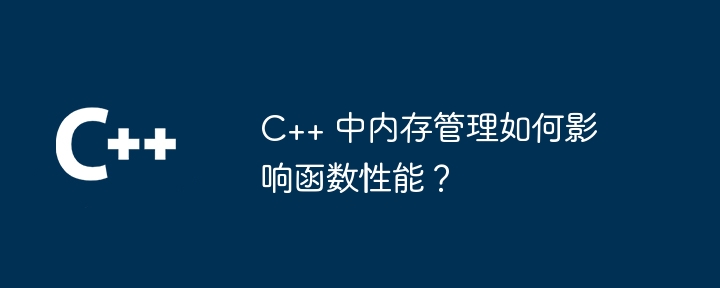Home >Backend Development >C++ >How does memory management in C++ affect function performance?
How does memory management in C++ affect function performance?
- WBOYWBOYWBOYWBOYWBOYWBOYWBOYWBOYWBOYWBOYWBOYWBOYWBOriginal
- 2024-04-18 22:18:021018browse
Memory management in C has a significant impact on function performance. Manual memory management provides finer control and higher performance, but increases coding complexity. Garbage collection simplifies the programming process and eliminates memory leaks, but may cause performance degradation. These factors must be weighed when choosing an appropriate memory management strategy.

Memory Management and Function Performance: C Practical Guide
Basics of Memory Management
C is a powerful object-oriented language. Provides a flexible memory management mechanism. Programmers can manage memory manually, or they can use an automatic mechanism called garbage collection.
Manual memory management and its performance impact
Advantages:
- More granular control, improved performance
- Reduce Memory leaks and dangling pointers
- Allocating and freeing memory on the heap by using the new and delete operators
Disadvantages:
- Error-prone (memory leaks, dangling pointers)
- Increases coding time and complexity
- For small or single-threaded applications, manual memory management may not be necessary
Garbage Collection
Advantages:
- Automatically release memory no longer needed
- Eliminate the risk of memory leaks and dangling pointers
- Simplify programming code and reduce errors
Disadvantages:
- Performance may be reduced as it may trigger at inconvenient times Garbage collection
- There is no control over when memory is released, which may lead to memory fragmentation
- For real-time applications, garbage collection may not be a suitable solution
Practical case: Measuring the impact of memory management on function performance
Sample code:
#include <iostream>
#include <vector>
using namespace std;
// 手动内存管理
void manual_memory_management() {
int* ptr = new int; // 在堆上分配内存
*ptr = 10;
delete ptr; // 释放堆上分配的内存
}
// 垃圾回收
void garbage_collection() {
vector<int> v;
v.push_back(10); // 在堆上动态分配内存
}
int main() {
// 手动内存管理计时
int manual_time = 0;
for (int i = 0; i < 1000000; i++) {
auto start = std::clock();
manual_memory_management();
auto end = std::clock();
manual_time += (end - start);
}
// 垃圾回收计时
int gc_time = 0;
for (int i = 0; i < 1000000; i++) {
auto start = std::clock();
garbage_collection();
auto end = std::clock();
gc_time += (end - start);
}
// 打印结果
cout << "手动内存管理时间:" << manual_time << "ms" << endl;
cout << "垃圾回收时间:" << gc_time << "ms" << endl;
}Running results:
Depending on your specific hardware and compiler , results will vary, but manual memory management is usually a bit slower than garbage collection.
Conclusion:
Memory management in C has a significant impact on function performance. Manual memory management provides finer control and higher performance, but increases coding complexity. Garbage collection simplifies the programming process and eliminates memory leaks, but may cause performance degradation. These factors must be weighed when choosing an appropriate memory management strategy.
The above is the detailed content of How does memory management in C++ affect function performance?. For more information, please follow other related articles on the PHP Chinese website!

